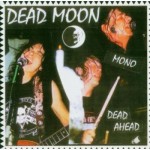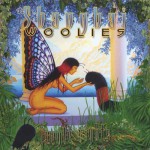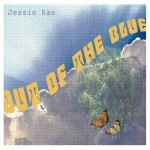Dead Moon
 Dead Ahead
Dead Ahead
Tombstone Records
The last line in “In The Waiting,” the last song of this eleven-track opus, says it all- “We’re never too old to learn.” If “Music too tough to die” were not already their motto, that last line would serve Dead Moon quite well. Fred and Toody Cole (along with drummer Andrew Loomis) prove that they learn something new and valuable each and every day. Every one of these eleven songs drips with the emotion and intensity of living each day in this whacked out world- hanging on to life and love by just a tenuous thread.
Fred Cole has been a rocker since he was thirteen: and that was over 40 years ago, and he was Fred “Deep Soul“ Cole, the “white Stevie Wonder.” If anyone knows about the highs and lows of the “music business,” it’s Fred Cole. When, in 1967, he met his eventual wife Toody at the Folksinger coffeehouse in Portland, while trying to find a gig for his stranded and destitute, draft-evading band, the Weeds- he did not know how completely the course of his life had been altered. Toody’s been playing bass in his bands since the late ‘70s. For his thirty-ninth birthday, she gave him the very mono disc-cutting lathe (now fifty years old) upon which was cut the Kingsmen’s “Louie Louie.” Fred and Toody are a team.
Or, as Fred so aptly puts it in the song of the same name, “I find myself in an occupation with you.” And a pre-occupation as well, one might add. And it’s Toody who really shows a lot of improvement on bass for this go around. After twenty-five years on her instrument, she proves that “we‘re never too old to learn.” But, as with every other Dead Moon album in existence, the driving force is Fred and the classic songs he writes. And, in that regard, this is one of the strongest albums the band has ever put out. As always, the songs are roughly wrought, twisted and gnarled by the high-pitched whine of Fred (and occasionally Toody’s) vocal deliveries. And, as is generally the case, Fred has written his fair share of apocalyptic lyrics, which he sings with appropriate dread. But here, he is far more candid (if typically elliptical) than ever before about personal emotional issues- with great results.
For anyone who missed the ‘60s the first time around, Fred stylistically resembles no one more than Arthur Lee of the great, seminal ‘60s LA psychedelic band, Love. In fact, at this late date, Fred does a far better rendition of Arthur Lee circa the ‘66 release of Love’s self-titled first album, than Arthur Lee ever did. The fact that this album, like most Dead Moon albums, actually sounds like it was recorded in 1965 only adds to the mystique. Or so it says here. The album kicks off with the rousing “Signs Of Departure.” Over a sustained, militant snare roll by Loomis, straight out of “Wipe Out,” Fred and Toody double up on an insistent E-G-D chord progression. The last verse is especially telling: “Yeah has-beens, could-be, might-have-beens/Going down the drains of false pretense/Finally got the message and it’s making sense/The grass is green on both sides of the fence.”
“One World” is a stirring anthem, pretty much summed up in a single line of the memorable chorus.” One world, one voice, one girl, one choice.” Toody’s fugal bass lines drive the aforementioned “An Occupation with You,” which rates quite highly in the Arthur Lee index. Toody’s sprinting basslines in the transitions between chorus and verse are the pinions of “Dawning Of The Dead.” Fred’s Spanish guitar-flavored solo is the highlight of “Already Gone.”
One of the best moments of the set comes with the incendiary “ War Is Blind.” Over Toody’s explosive bass and Loomis’ hard hitting kit, Fred shreds with his guitar artillery; while howling about the end of the world. “Threatened by the firestorm/Lying on the edge of war/If we don’t heed the warning sounds/The black rain is coming down.”
Conversely, “Go My Way” is an up tempo love song, distantly related to songs such as the Beatles’ “All My Loving.” Meanwhile, “On And On” sounds like a cross between Love’s “Message To Pretty” and the Byrd’s “My Back Pages;“ with Toody’s lurching bassline providing drama, as well as momentum. It‘s not entirely certain who is taking the lead vocal role on “The 99’s,” but it doesn’t sound like Toody or Fred. It’s a song about rebellion, maybe about a gang of street kids or something like that: “We are your social imperfections/Accept us for what we are/We are the dark side in mourning/We’re never gonna show our scars/We’ve been pierced by your arrows/We’ve been pierced in steel/You’ve tried to break our spirit/But you never will.”
Toody’s Bach-like contrapuntal bassline, is the perfect platform for Fred’s summation of the world as it is: “Sooner or later, everyone knows/Our darkest secrets are being exposed/We’re on trial for the execution/Broken homes and broken dreams/Living a life way above our means/We’re the problem, not the solution.” That is as profound an assessment of our world, as any proffered by the likes of journalists such as Thomas Friedman of the New York Times. Fred Cole walks the walk and talks the talk and he lives up top his ideals. And Toody and Andrew are standing right behind him. Toody handles the vocal duties on “In The Waiting,” a song in which faint echoes of Buffalo Springfield and Patti Smith filter in weird tandem through the arrangement.
It is perhaps fitting that, at long last, Dead Moon seem to be receiving their just due. Earlier this year an independent film about Fred and Toody, Unknown Passage, was released to favorable critical response. And anticipation for this new release seems to be high as well.
In a lot of ways Fred and Toody have a lot in common with Portland’s other long-time couple of local rock- Marv and Rindy Ross. But where Marv and Rindy may have compromised their lives somewhat to succeed on the gold record level with Quarterflash, Fred and Toody made a conscious decision to go another way. They have built their lives and their careers from the bottom up: to the point that now they are real, documented authentic folk heroes, despite the fact that they are staying only “one step ahead of a day job.”
Still, after putting out countless albums which live up (or down) to the lo-fi, DIY ethic, the band has reached a point of competency where these aspects no longer serve to mask their deficiencies- but to obscure their abilities. Poorly engineered recordings, un-mastered, with muddy vocals and roughly mixed instrumentation cannot diminish the strength of their material or the rawness of its presentational appeal. But, if only just once, one would hope to hear the true power which Dead Moon convey on the live stage, competently captured in the studio (perhaps the Dead Moon equivalent of Love’s classic album Forever Changes? Well then, at least the majesty of that first, eponymous album).
Dead Moon, by design perhaps, have not gotten rich in the business of music; nor have they sold their souls (deep Cole souls) to become something they are not. They are a band buoyed by its strengths, rather than hindered by its shortcomings; and that may well be the best measure of any artistic endeavor, but certainly theirs. And, after all, they truly are never too old to learn.
Curtis Salgado
 Strong Suspicion
Strong Suspicion
Shanachie Records
Talk about local legends! There’s none greater than Curtis Salgado. From his long time stint with Robert Cray in the ‘70s; to his inspiration for John Belushi (who was filming Animal House in Eugene, in 1978 when he first saw Curtis, performing with Cray) in forming the Blues Brothers with Dan Akroyd; to his years with the noted Boston-bases R&B outfit, Roomful Of Blues; to the respect he is finally receiving after thirty-five years in the business- Curtis Salgado has absorbed every nuance of his craft.
After all this time, it might be hard to conceive that the old dog Curtis has any new tricks up his sleeve (as it were). But there it is! And here it is. For this album, these twelve songs (nine of which are penned by Salgado or members of the retinue) comprise the best recorded performance in Salgado’s long and illustrious career.
A lot of the credit for the sonic cohesion found throughout this project goes to producer Marlon McLain, whose own link to the local funk scene goes back at least as far as Curtis’ does with r&b. But Curtis, too, seems to have put it all together with this album. His choice of cover songs is superb- and his renditions of those songs add new dimensions rather than traverse well-trodden ground. This is most spectacularly demonstrated in his stirring version of the Beatles’ “No Reply.”
Think of Al Green in his prime, with a full-on Hi Records Memphis sound behind him, doing a spine tingling interpretation of a classic Beatles nugget; so turned around and upside down that only a true Beatles fan would even recognize the song. Outta sight! And Curtis’ take on O.V. Wright’s gospel-tinged “Born All Over” is faithful, yet expansive. While his adaptation of Bill Withers’ “Who Is He And What Is He To You” goes to places of which its composer could only dream.. His tender reading of Leon Russell’s “Help Me Through The Day” gives new life to a lovely ballad, with the help of Jacob Wolf’s guitar work, reminiscent of Stevie Ray Vaughn. And speaking of Leon Russell, “Love Her Just Because” calls to mind Russell’s loopy rubbernecked Delta style, interjecting a double-reeded harmonica solo in the middle.
But, the level of the original material found here is of a far higher caliber than in previous incarnations. Bassist Willy Barber’s “Give Me Patience” is a hard hitting number with tight, rock-inflected ensemble work, bolstered by guest Sonny Landreth’s smoldering slide guitar work and some fiery female backup vocals. Landreth adds a delta flavor to the romping. Little Feat-ish title track, with slick fills supported by Rusty Hall’s keyboard pads and DK Stewart’s open ended piano interjections. Lloyd Jones’ “Can’t Stop Lovin’” benefits immeasurably from Bekka Bramlett’s big-voiced participation in a vocal duet with Curtis.
Bekka Bramlett could fill a page or two with her own bio. Daughter of famed duo Delaney and Bonnie Bramlett, Bekka has been singing since age four when she first appeared on one of her dad’s recordings. She was a member of Fleetwood Mac in the early ‘90s, temporarily replacing Stevie Nicks. There she met Billy Burnette (who had replaced Lindsey Buckingham). She later performed in a duo with Burnette. Along the way, she has sung backup for the likes of Belinda Carlisle, the Moody Blues, Rod Stewart, Joe Cocker, Billy Joel and Vince Gill, as well as a host of other country artists- to name just a few. That she is appearing on a Curtis Salgado album is a real feather in Curtis’ hat. And she sounds great in tandem with him, her gritty Memphis drawl all over his soulful lead vocals like ice cream on hot apple pie. Yum yum!
Curtis moves to his upper register, sounding like a gospel blues Prince along the way, with “Inside My Heart.” He finally wheels out his harp again (that was how he first came to fame after all) on “Money Must Think I’m Dead.” A nice shift of gears, “At Least I Didn’t Do That” has the sort of vocal phasing in the verses that Donald Fagen made popular with Steely Dan, circa Pretzel Logic. However, Donald Fagen is many things, but he is no Curtis Salgado, when it comes to vocalization. Bill Withers is circulating through there too. But, when Curtis cuts loose, it’s all Salgado baby.
“Don’t Wait Until Tomorrow” is a molten piece of swamp sludge, a mush-mouthed Curtis sliding cool over drummer Don Worth’s smart beat, while a funky cool jerk/Hendrix riff rocks just beneath the surface. Curtis lays in a taste of smoky harp in the middle and end solos, adding more harp in the “secret track” wherein he duets with a Pavarotti like howling dog.
Curtis Salgado puts it all together with this album. All the years of struggle and setbacks have led to this solid piece of work- certainly a fitting culmination of an illustrious career. Salgado covers a wide range of stylistic ground from blues to r&b and soul- with nary a misstep. His robust supporting cast adds a glistening sheen to the production, as well as sinuous muscularity. If this album doesn’t grab recognition for Salgado on a national level, then there is not a lot of hope for the business of music.
Shanghai Woolies
 Jungle Nights
Jungle Nights
American Gavabun Records
Another album released by a pack of local veterans is this oddly zesty, slightly off-kilter effort from the Shanghai Woolies. The band is the brainchild of Pink Martini trumpeter, Gavin Bondy, who has decided to personally revive the “hot jazz” movement- a form of music popular throughout the 1920s, which was a combination of ragtime jazz, Negro spirituals, blues, and European music. Louis Armstrong, Duke Ellington, Don Redman, and Fletcher Henderson led some of the more popular early big bands playing “hot jazz.” These groups featured jazz stars of the day as well as future big band-leaders such as Coleman Hawkins, Benny Goodman, Glenn Miller, Roy Eldridge and Benny Carter.
But, what truly inspired Bondy was the concept of fusing rock elements with hot jazz – as bands such as the Cherry Poppin’ Daddies and Big Bad Voodoo Daddy had done with the swing music revival of the 1990s. After a couple of attempts at perfecting his cast of characters (and band name) he has arrived at this Shanghai version of the Woolies. Along with his reed playing brother, Clark Bondy, Gavin has brought in his wife, Mel Kubik (who played keyboards and sang with local bands such as Dub Squad, Quarterflash, to name but a few). Here, she is on board as the vocalist, calling to mind a New Age Ella Fitzgerald in her way with a cooing phrase.
Of course, what band would be complete without the input of ace guitarslinger Tim Ellis? Here he adds everything from Hendrixian sputter to his solo on the first track, Ellington’s “East St. Louis Toodle-oo,” to steadfast banjo on the standard “I’m Confessin’.” Speaking of Steely Dan’s Pretzel Logic, they did a version of this number too, with the illustrious Jeff “Skunk Baxter lending pedal steel guitar solos to that mix. Here, Ellis brings the song into the 21st century, with a mind-blowing, wired in solo.
As far as the quality of musicianship goes here: this stuff is easily up to the high standards of Pink Martini or 3 Leg Torso or any other upper echelon troupe- played with authority and true understanding of the genre. These are not rookies merely reading well-written charts. The program is mostly period-music, with only a single original number, Kubik‘s “Till My Baby Comes Back Home,” which fits right in with the rest of the material.
Gavin’s take on Harry James’ “Concerto For Trumpet” lacks perhaps the master’s fluid flow, but is certainly a skillful performance, beefed up significantly by Ellis’ ripped up solos, as well as a nice interplay between Clark Bondy and trombonist Tom Hill. Their take on “Bessie Smith’s “I’ve Got What It Takes,” is cheeky, though maybe a little tame by Bessie’s standards. Kubik’s intonation here is more reminiscent of Billie Holliday. Drummer Dan Steuber’s dexterous washboard work harkens back to the earliest, pre-‘20s jazz recordings.
Ellis provides dive-bomber guitar riffage to the arrangement of Ellington’s “Jungle Nights In Harlem,” supplanting the necessity for a big horn section in this little big band. The band interpret the piece in a slightly arcane, cartoon-like setting, reminiscent of the work of Raymond Scott in the late ‘40s; especially Gavin’s spectacular whacked out wah-wah muted trumpet solo. Ella’s version of the chestnut “I’m Confessin’” serves as the template for Kubik’s rendition, while Clark Bondy leads the team through a series of deftly executed solos.
Kubik stands out on Lil Green’s “Give Your Mama One Smile,” a song more demure than some of the others she sings here- and better suited to her girlish voice. A fairly straight reading of the tune by the ensemble, gives it an authentic feel. Steuber lends a Gene Krupa like tom-tom fury to Artie Shaw’s “Serenade To A Savage” while the band moves through intricate changes with savvy aplomb. Kubik takes Peggy Lee’s recitation of “Why Don’t You Do Right” (originally performed with the Benny Goodman Orchestra) and streamlines it while the band smokes the bejesus out of it, with Ellis’ blustery guitar weeding out changes Charlie Christian could only dream about. Mel’s take on Ethel Waters’ 1938 nugget “You’re Mine,” sounds more like Bernadette Peters than Ethel, which isn’t necessarily such a bad thing.
To say the Shanghai Woolies are throwbacks is to shortchange them of the hard work they put into sounding good enough to be considered throwbacks. Gavin Bondy’s precise arrangements capture the essence of the hot jazz era, while doing more than merely imitating the sound of the day. Instead, they have given the music renewed vigor, utilizing every trick at their disposal, while playing the hell out of some pretty complicated music (complicated by rock standards, anyway).
Anyone who pines to hear jazz the way it once was played in the early years: hard and hot, will love what the Shanghai Woolies are doing. They evoke an era gone by in such a way as to make the music current and credible by today’s samples and drum machine standards. They play with skill and panache and are sure to make tons of money playing the same party circuit Pink Martini once mined. They deserve the money.
Jessie Rae
 Out Of The Blue
Out Of The Blue
Self-Produced
It’s been over three years since we last heard from Jessie Rae. The band, primarily comprised of singer/songwriter Joan Meyer and her partner, guitarist Lauren Semler, also features drummer Kipp Crawford, percussionist Wendy Owens and keyboardist Matt Burnett, as well as a host of guest performers. The music remains much the same- thoughtful lyrics, sung by Meyer; with faithful, if somewhat bland, ensemble accompaniment.
“Blue Armor” is a reggae-tinged number with a nice chorus; while “Can You Explain,” “Miracle” and “Don’t Care” exhibit a rockier edge than found on the previous album. The instrumental, “Affectionate Soul,” displays a funky side; while a country feel invests “Walk With You.” “Around Here” is a pleasingly low-key love song and the highlight of the set.
The music of Jessie Rae is easy listening, if a tad colorless. Inoffensive. Emotionally subdued. Sincere. Pleasant. The band isn’t going to bowl you over, but the suspicion is that that’s not the point of their music, in the first place.
Jordan Kolton
 When The Hammer Drops
When The Hammer Drops
Self-Produced
Jordan Kolton is a serious young/singer songwriter, with a big, full voice; whose influences could be traced back to Paul Simon, to the early Eagles through Richard Thompson and up to Shawn Mullins. The songs share a somewhat apocalyptic vision, dealing in interpersonal relationships and their ultimate effect upon the world at large.
Some of Kolton’s songs fail to hold their center , with no true chorus or melodic them to serve as locus to a musical theme. But there are instances where he shows real promise. “Hanging By A Thread” recalls the mood of the Eagles’ “Outlaw Man” as well as the styles of the Outlaws’ “Green Grass And High Tides” and that of a little-known ’70s folk-rocker named Michael Stanley. Over a familiar Em-D-C chord progression, Jordan sings a romantically pastoral lyric about the tenuousness of his emotions in an intense relationship. Ben Cartwright adds a vibrant Mark Knopfler-esque guitar solo in the middle.
“Are You Here?” is a contemplative ballad with a pretty chorus and valid point of view. Jordan’s vocal melody line can’t quite handle the nuances of his E-Emaj7-A-Am-E chord progression on “Another Place Called Home,” but he gives it a good try. Thematically, “Reason To My Rhyme” resembles the work of Tim Buckley’s later years. A gentle, rustic melody informs the lyric of the title track.
Jordan Kolton’s talents are clear on several songs, if not as yet come to full fruition. Given time and the desire to improve at his craft, it is reasonable to assume that better things lie ahead for him in the future.
